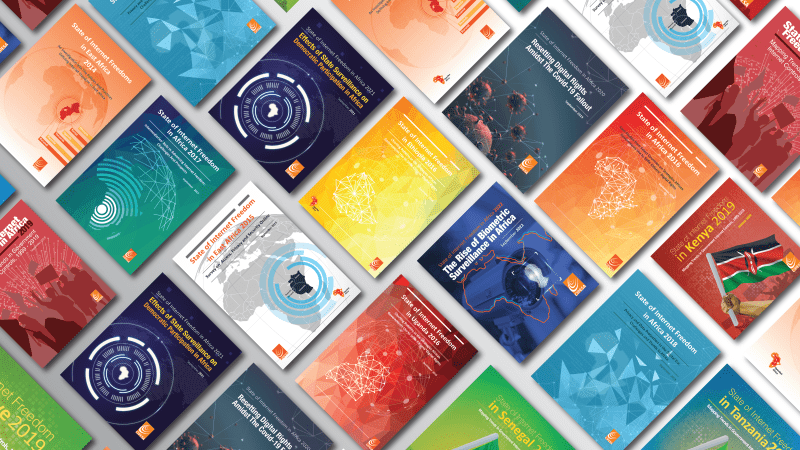By CIPESA Writer |
As we approach the Forum on Internet Freedom in Africa (FIFAfrica23), we’re excited to share vital insights about a cornerstone of the event. Our flagship annual ‘State of Internet Freedom in Africa Report’ illuminates trends in internet freedom across Africa.
Since its inaugural edition in 2014, we’ve published a series regional reports and numerous country-specific analyses, solidifying the impact and influence of the report in the field.
The State of Internet Freedom in Africa has come serve as a reference point for a diverse array of stakeholders, both governmental and non-governmental, offering essential context and generating robust evidence to inform policy-making and practice in the ICT sector. Additionally, it amplifies awareness regarding internet freedom matters on the continent, sparking meaningful dialogues among digital rights advocates throughout Africa.
Below is a quick summary of what the reports have covered over the years.
Documenting the State of Internet Freedom in Africa
| 2022 – The Rise of Biometric Surveillance: The report highlights the increasing risks in the use of biometric technologies by governments for surveillance and social control in Africa. The report raises concern that in the absence of adequate safeguards, biometric technologies such as facial recognition, fingerprinting, and iris scanning could be abused to monitor citizens’ activities, track their movements, and limit their freedoms. | |
| 2021 – Effects of State Surveillance on Democratic Participation in Africa: The report documents how surveillance practices are becoming more pervasive in Africa, with governments using advanced technologies to monitor citizens’ online activities and infringing on their right to privacy. These practices have had a chilling effect on freedom of expression, association, and assembly, and limited opportunities for civic participation and engagement. | |
| 2020 – Resetting Digital Rights Amidst the Covid-19 Fallout: The report focuses on the impact of the COVID-19 pandemic on digital rights and freedoms in Africa. It also highlights how the pandemic led to an increase in internet censorship, surveillance, and online violence against women, as well as the negative impact of internet shutdowns on access to information and public health messaging. | |
| 2019 – Mapping Trends in Government Internet Controls 1999-2019: The report provides an overview of the evolution of government internet controls in Africa over the past two decades. It highlights how African governments have increasingly adopted internet censorship and surveillance practices, implementing internet disruptions and arresting online activists, bloggers and journalists. | |
| 2018 – Privacy and Data Protection in the Digital Era: Challenges and Trends in Africa: The report highlights how African countries are lagging behind other regions in enacting data protection laws and regulations. It also highlights the increased risks of data breaches and other privacy violations and the impact on internet freedom. | |
| 2017 – Intermediaries’ Role in Advancing Internet Freedom in Africa: Challenges and Prospects: The report provides an overview of the role of intermediaries, such as internet service providers (ISPs) and social media platforms, in promoting internet freedom in Africa. It also highlights how African governments censor and control online content and the challenges faced by intermediaries in balancing their obligations under legal and regulatory frameworks and promoting internet freedom. | |
| 2016 – Case Studies from Select Countries on Strategies African Governments Use to Stifle Citizens’ Digital Rights: The report provides an overview of the various strategies employed by African governments to restrict citizens’ digital rights and examines case studies from a number of African countries, highlighting specific incidents of internet censorship, surveillance, and the persecution of online activists and journalists. | |
| 2015 – Survey on Access, Privacy and Security Online: The report surveyed internet users in six African countries and highlights the challenges that they face in accessing the internet, protecting their privacy and security online, and accessing information. It also examines the role of governments in regulating the internet and calls for greater transparency and accountability in their policies and practices. | |
| 2014 – An Investigation into the Policies and Practices Defining Internet Freedom in East Africa: The report provided an analysis of the policies and practices of governments and Internet service providers in Burundi, Ethiopia, Kenya, Rwanda, Tanzania, and Uganda. It also identified the key challenges facing internet users in these countries, such as censorship, surveillance, and online harassment. |
What would you like future reports to explore? Share your thoughts on social media and tag us (@cipesaug). Remember to use the hashtag #InternetFreedomAfrica and/or #FIFAfrica23!
Visit our extensive report library here.
Media Support
Send media queries to: [email protected]
- Excited to be part of #FIFAfrica23 by @cipesaug, where we’ll dive into pressing issues shaping and informing #InternetFreedomAfrica. Together, we can forge a path towards a more open and inclusive digital landscape. See you there! www.internetfreedom.africa
- Calling all champions of internet freedom! #FIFAfrica23 is THE event to be at. Let’s amplify our collective voice for a free and open internet in Africa. Can’t wait to connect with you all! #InternetFreedomAfrica @cipesaug
- Thrilled to attend #FIFAfrica23 and discuss how we can advance digital rights in Africa. As a community, we’ll drive change, promote inclusivity, and foster innovation. See you at the forefront of this vital conversation online and offline! #InternetFreedomAfrica @cipesaug
Media Support. Send media queries to: [email protected]

